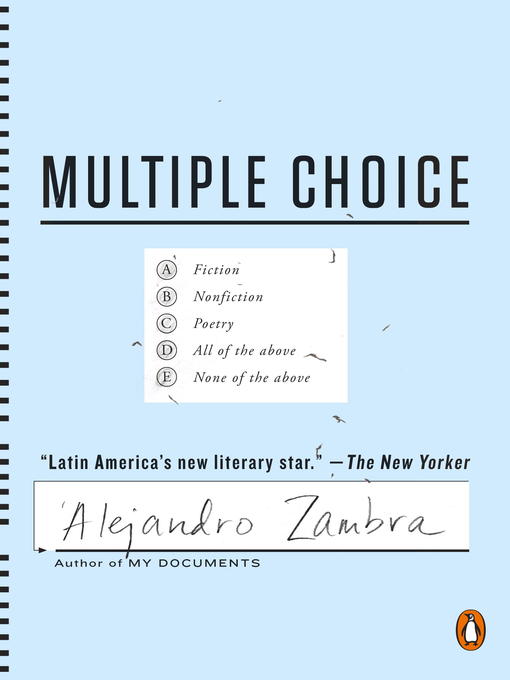
Multiple Choice
کتاب های مرتبط
- اطلاعات
- نقد و بررسی
- دیدگاه کاربران
نقد و بررسی

May 16, 2016
In this short, experimental book of fiction, Zambra (My Documents) skillfully adopts the form of a standardized test to spin off dozens of micro-tales. The form of the test, which is based on the actual Chilean Aptitude Test Zambra took as a youth, is composed of five numbered sections, totaling 90 questions. The book opens with questions and possible answers that are simply lists of words, not giving Zambra much room to stretch his storytelling wings. The following sections, composed of short sentences, read like flash fiction or prose poems and are frequently amusing and unexpected. Far more compelling are the longer “sentence elimination” sections wherein Zambra is able to deliver a self-contained short story in a handful of pages. In one story, a student convinces his smarter twin brother to take his exam for him. Another story presents a tricky problem for a couple getting married in Chile, when divorce was still illegal there. The final story is a touching message from a remorseful father to his son. Zambra’s writing is intensely tied to his Chilean identity, and nearly every story or text references Chile in some way. In just a few pages he manages to be repeatedly engaging, smart, funny, and sad. Agent: Andrea Montejo, Indent Literary Agency.

May 15, 2016
True or false: can effective fiction be written in the format of a standardized test? Answer: pretty much, and few are as equipped to do it as well as Chilean writer Zambra (My Documents, 2015, etc.), who has a penchant for experimentation. The book is broken up into 90 questions across five sections. At first those questions are largely ironic or comic in simplistic ways. For instance, the reader is asked to name the word that has no relation to "bear": "endure," "tolerate," "abide," "panda," or "kangaroo." But as the test focuses on completing, ordering, and eliminating sentences, it's clear Zambra is aiming for more sophisticated and poignant effects. The questions become flash-fiction tales about transition points like lost loves, the discovery of a tumor, and a grandfather's death, and the multiple-choice answers suggest that how we respond to a story depends heavily on where the writer places the narrative stress and what's omitted or added. (For instance, a first-person story about the successes and failures of his children prompts the reader to rethink the story if lines about grandchildren and planned pregnancies are removed.) This reaches a kind of climax in the "reading comprehension" section, made up of three brief stories about a scheming pair of twins and couples that have split up. The follow-up questions tend to highlight the absurdity of pat answers to works of fiction. ("What is the worst title for this story--the one that would reach the widest possible audience?") Even so, Zambra can sometimes insistently point to a "correct" answer: for a question in the story about school's influence, the only option is: "You weren't educated; you were trained." Though the overall effect is fragmentary, Zambra's fragments are consistently witty and provocative. A-minus.
COPYRIGHT(2016) Kirkus Reviews, ALL RIGHTS RESERVED.

June 1, 2016
From the author of the spellbinding story collection My Documents (2015) comes an odd exercise in the limits of fiction in a tale modeled after the Chilean Academic Aptitude Test and combining poetry, prose, and interactive storytelling. Zambra mocks the conventions of standardized exams by pairing straightforward questions with absurd answer options. The section on Sentence Order playfully challenges the reader to rearrange sentences and create a multiplicity of microfictions reminiscent of such great 1960s literary experiments as Julio Cortazar's Hopscotch (1966). But what begins with bursts of nonsensical silliness evolves into progressively more coherent, and often more somber, narratives. One section requires the reader to decide which sentences to eliminate, forcing a choice that can mean the difference between life and death. Zambra ratchets up the intensity, culminating in several extended passages under the heading Reading Comprehension. The subsequent questions do not seek to quiz the reader's understanding so much as further interrogate the narrator's loyalty to family and country. An ambitious, hilarious, provocative work.(Reprinted with permission of Booklist, copyright 2016, American Library Association.)

February 15, 2016
Chilean author Zambra was named one of Granta's Best Young Spanish-Language Novelists as well as a 2015-16 Cullman Center Fellow at the New York Public Library, and last summer critic James Wood gave his oeuvre a big shout-out in The New Yorker. So, literati, get ready for his new work, a probing study of love, family, and social pressure told in a multiple-choice format.
Copyright 2016 Library Journal, LLC Used with permission.

























دیدگاه کاربران